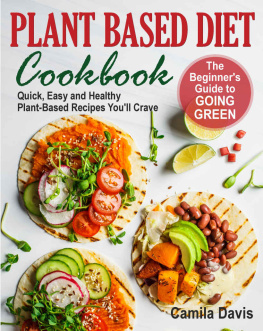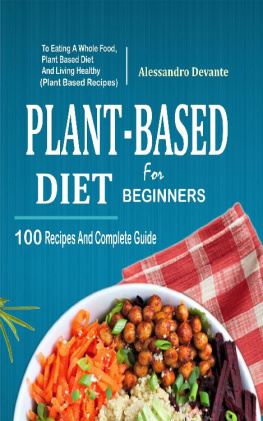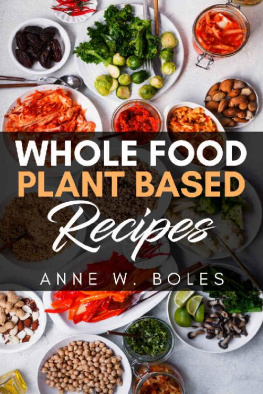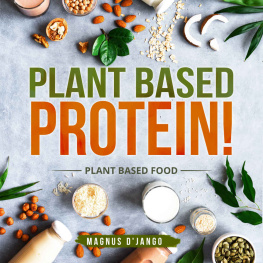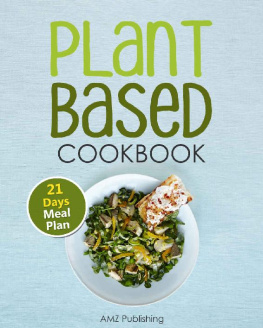Thank you for downloading this
AMACOM eBook.
Sign up for our newsletter, AMACOM BookAlert, and
receive special offers, access to free samples,
and info on the latest new releases from AMACOM,
the book publishing division of
American Management Association.
To sign up, visit our website: www.amacombooks.org

a
plant
based
life
a
plant
based
life
Your Complete Guide to
Great Food, Radiant Health,
Boundless Energy, and a Better Body
Micaela Cook Karlsen

For my many Ms and one D.
What you seek is seeking you
RUMI
CONTENTS
by T. Colin Campbell
FIVE STEPS TO GREAT FOOD AND RADIANT HEALTH:
making a plant-based diet easy and sustainable
ONGOING SUCCESS:
keeping up the momentum
FOREWORD
by T. Colin Campbell
Adopting diets mostly or entirely composed of intact, whole plantsvegetables, fruits, grains, legumes, nutshas been a challenge for decades, if not for centuries, given the natural human tendency to seek more calorie-dense foods. Animal-based diets have long been preferred by most people, becoming firmly entrenched in the cultural fabric of societies able to afford these foods. At the same time, taste preferences have, over time, become fixed to the point that we can now call them addictions. In recent decades, this has been exacerbated by the increased use of refined carbohydratesespecially sugars and refined floursprimarily for the purpose of responding to what we might refer to as snack attacks by creating sweet-tasting convenience foods, which are also loaded with fat and salt.
The scientific evidence in favor of a whole food, plant-based diet has become impressive in recent years, suggesting to many people an urgency in making a dietary change, for a variety of personal and public reasons. However, because of the seeming intransigence of dietary tradition, change can be quite difficult. A Plant-Based Life, by Micaela Karlsen, addresses this challenge with a personal and professional focus that readers will find both useful and compelling.
Among those of us involved in the scientific and clinical development of data on the benefits of whole food, plant-based diets, there is good consensus that we need to find ways to make change possible. It is not a lack of reliable evidence favoring this way of eating but a question of behavior change, as the professionals like to call it. How can people navigate change for themselves and their families and friends? On a societal scale, there are powerful institutions that will resist this change using all the resources under their control and at their command, however reasonable or unreasonable their efforts may be. The answer, it seems to me, is to go directly to the consumer and offer them some ideas that make easier their transition to a better lifestyle. Readers will find such ideas, and more, in this book, making the path to a plant-based life desirable as well as achievable.
PREFACE
AT AGE 17, I made a decision to stop eating meat. My reasons then werent anything like my reasons now. There was just a vague feeling that moved me to stop. It could have been related to the fact that some of my friends didnt eat meat, or it could have been some innate instinct for health, but for whatever reason, I just didnt want meat anymore. Becoming a vegetarian was gradual over months, but by the time I had turned 18 and was in my senior year of high school, I had stopped eating meat completely and began to think more specifically about my health. I was highly allergic to dust and dust mites, so much so that I was a candidate for weekly allergy shots. The shots helped but, it seemed, only up to a point. I have memories of waking up on the morning of my shots with dry lips and a sore throat from breathing through my mouth all night. I would sit up in bed feeling everything in the world start sliding downwards. My nose ran, the room spun, and it was all I could do to stumble into the shower, where the hot water gave me 15 wonderful minutes of normal breathing. Add skin problems, sleep deprivation due to insomnia, typical concern over my weight, and its amazing that I was still a good student.
The diet I ate as a vegetarian in high school involved lots of white bread, skim milk and cereal, cans of green beans for lunch, and orange juice. I organized my choices around an attempt to lose weight by eating a low-fat diet. I did lose weight, but I was always hungry. Constantly looking ahead to my next meal, while at the same time trying to concentrate on calculus or my after-school job, I limped along in a state of deprivation that seemed justified because it allowed me to maintain a healthy weightor at least a weight at which I didnt feel self-conscious. Moving into my freshman year of college soon ended my dedication to a low-fat diet as the all-you-can-eat buffets provided more than enough extra calories for me to gain the freshman 15.
During my junior year, one of my best friends, Meghan Murphy, took a popular course at Cornell, NS:200 Vegetarian Nutrition, taught by Dr. T. Colin Campbell, the universitys Professor Emeritus in nutritional biology, and later the coauthor of The China Study (2005), the first and most comprehensive account of the research on plant-based diets and health, as well as author of Whole (2013). Through Meghan, the evidence-based, scientific information about diet and disease began to seep into my thinking. Having already read John Robbinss Diet for a New America, and eaten a vegetarian diet for several years, it was no big mental leap to cut out dairy and think of myself as a vegan. Physically, my cravings for cheese remained in full force for a few years (in contrast to giving up meat), but intellectually a totally plant-based diet made sense.
By the time I began working for Dr. Campbells foundation in my mid-twenties, Id been eating what I considered a vegan diet for several years, had much improved my allergies and skin, and had settled into something close to my ideal weightand minus the deprivation. Being so closely involved with information about whole food, plant-based (WFPB) nutrition, I was able to further refine my understanding of what whole food meant. It took me at least another six months to a year to move into a truly whole food, 100 percent plant-based diet, but its now been almost a decade of this gradual shift, and I couldnt be more pleased. Once I started eating a truly whole food, plant-based diet, I felt comfortable in my body for the first time since I was a child. I still have challenges when Im in certain food environments and I have to strategize around them to make sure that I dont get pulled back down the addictive rabbit hole of fatty foods. But I am able to maintain my dietary lifestyle successfully because of specific strategies that are discussed in this book, and these strategies can work for everyone.
The people whose stories are shared in A Plant-Based Life, who provide supporting evidence for the research and examples of certain principles well cover, can also serve as inspiration to you. Many who were motivated have struggled. They have overcome their backgrounds, their childhood eating patterns, unsupportive family members or spouses, and challenges with their children, but they have achieved permanence in following a dietary lifestyle that is quite unusual in the current environment, and they have attained good health that they can enjoy for many years. I was one of those people, and it took me years of trial and error to arrive at a peaceful and successful place with my eating and my diet. Im grateful for what Ive learned, and now Id like to help you skip some of that difficulty.
Next page

